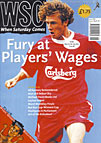 Hankies out for the European Cup-Winners Cup, which ended its days at Villa Park on May 19, 1999. Cris Freddi looks back on a trophy largely unloved outside Magdeburg.
Hankies out for the European Cup-Winners Cup, which ended its days at Villa Park on May 19, 1999. Cris Freddi looks back on a trophy largely unloved outside Magdeburg.
So farewell then ECWC. No more clogging up sentences with “European Cup-Winners Cup quarter-final second leg”. The last of the three Euro competitions to be founded is the first to disappear. Fair enough, perhaps, and I suspect it won’t be unduly mourned.
Even so, a number of clubs and countries have been grateful for its existence. It was the first European trophy to be won by English clubs (Tottenham 1963, West Ham 1965), the last before the Heysel ban (Everton 1985) and the only one since (Man Utd 1991, Arsenal 1994, Chelsea 1998).
It has also been the only one lifted by some leading clubs – Sporting Lisbon, Chelsea, Rangers, Aberdeen – and even entire countries: Czechoslovakia (Slovan Bratislava 1969), East Germany (Magdeburg 1974), Belgium and the Soviet Union three times each.
It has seen a few milestones in its time. The first sendings-off in a European final (Norman Hunter and Riccardo Sogliano in 1973); the first trophy decided on penalties (Valencia v Arsenal 1980); the only goals scored direct from corners (João Morais of Sporting in 1964, Barcelona’s Carlos Rexach in 1969); the only goalscoring brothers (Thomas Allofs in 1979, Klaus in 1992); the only player-coach (Gianluca Vialli). The only players to score six goals in a European match did it in the Cup-Winners: Mascarenhas in 1963 when Sporting Lisbon beat Apoel Nicosia 16-1, Lothar Emmerich in 1965 for Dortmund against Floriana of Malta and Kiril Milanov in Levski Spartak’s 12-2 stroll over Reipas Lahti in 1976.
It has provided a stage for serial winners like Kurt Hamrin, the brilliant little Swede who destroyed Rangers in both legs of the inaugural final (1961), scored again the following year and struck twice for Milan when they won in 1968. Rob Rensenbrink looked every inch the successor to Cruyff when scoring twice in 1976 and again in 1978. Oleg Blokhin scored in the final for Dinamo Kiev in 1975 and again 11 years later.
Without the ECWC, there would have been no way into European competition for Welsh clubs and we would have missed the heroics of Bangor, who beat Napoli 2-0 in September 1962 before losing narrowly in a play-off; Wrexham, who lost only 2-1 on aggregate to Rensenbrink’s Anderlecht in the 1976 quarter-finals; and Cardiff City, whose various exploits included the 1968 semi-finals, where they lost to a late goal after drawing in Hamburg.
At times the winners have even looked the best team in Europe. If nothing else, the Cup-Winners established a platform for three superb Soviet sides and a reminder that Valery Lobanovsky has been preparing brilliant teams for a quarter of a century. His Kiev sides of 1975 and 1986 each won the final 3-0. The first brought us the speed and flair of Blokhin and Onishchenko on the wings. The second provided the backbone of the USSR’s exciting team at the 1986 World Cup: Bessonov, Baltacha, Oleg Kuznetsov, Demianenko, Rats, Zavarov, Belanov, Blokhin again. In 1981 a dazzling Dinamo Tbilisi (Chivadze, Kipiani, Daraselia, Shengalia) won 4-1 at Upton Park on their way to winning the trophy.
In the 1975 Super Cup, Kiev beat Bayern Munich 1-0 and 2-0, and the sight of Blokhin outsprinting poor Georg Schwarzenbeck to score all three goals is one of the big memories. Others include West Ham’s passing and movement in the 1965 final; Emmerich’s shooting power destroying them in the semi-final the following year; Mark Hughes scoring both goals in 1991 to beat a club (Barcelona) that had sold him; Osgood strutting his stuff against Real Madrid two decades earlier; Nayim lobbing Seaman from 40 yards.
Above all, for anyone who hated the so-called hard men of the early Seventies, Norman Hunter’s sending-off in the 1973 final for retaliating against Gianni Rivera (of all people) is heartwarming. If you want to see the leg-biter grimacing in the kind of pain he inflicted on so many others, get the video: it’s a hoot.
All in all, however, you could never quite escape the feeling that the competition was a kind of second best. Too many poor teams reached the final (West Ham 1976, Antwerp 1993, Rapid Vienna 1985 and 1996). Some winners used it as a stepping stone to higher things the following year (Milan 1968, Juventus 1984) or the near future (Bayern 1967, Ajax 1987, Barcelona 1989), while others simply seemed to be slumming it (Milan 1973, Barcelona a record four times).
So it probably had to go. Three European competitions has always been too much of a good thing. A couple of thoughts to mark its passing. Although eight holders reached the final the following year, it was the only one of the three never to be retained. And it was a cup for winners of a cup, which made it the closest to the original spirit of European competition. Something else that’s on the way out.
From WSC 148 June 1999. What was happening this month